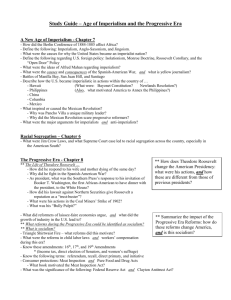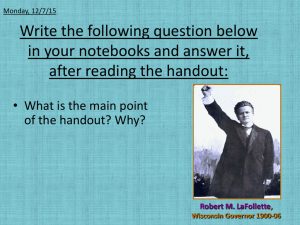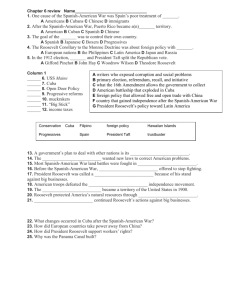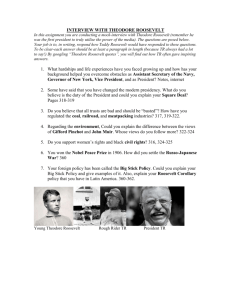Review Imperialism and Progressive Era Reforms
advertisement
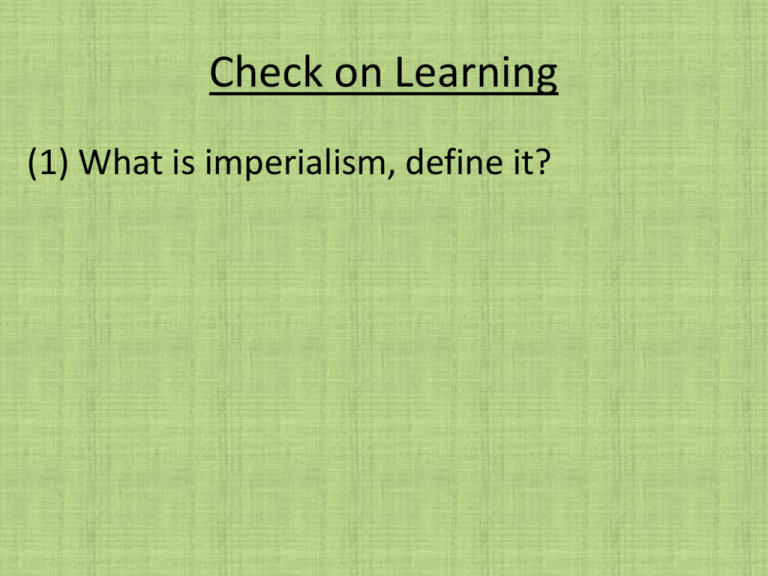
Check on Learning (1) What is imperialism, define it? Imperialism • The economic and political domination of a stronger nation or people over a weaker one Check on Learning (2) The following term refers to the superiority of the racial quality of English-speaking nations that had supposedly superior character, ideals, and systems of government. – A. Ethnocentrism – B. Nativism – C. Jingoism – D. Anglo-Saxonism Check on Learning (3) The following term refers to an aggressive feeling of strong nationalism. – – – – A. Ethnocentrism B. Nativism C. Jingoism D. Anglo-Saxonism *** The U.S. entering which war is commonly associated with this concept of an aggressive feeling of strong nationalism. Causes of Spanish-American War • Cuban Rebellion / “Cuban War of Independence” – Seen as similar to “American Revolution” • American investments in Cuba – $50 million in investments • Yellow Journalism – Sensational news stories • USS Maine – Blamed on the Spanish Check on Learning (4) What were the causes of U.S. and Western imperialism? • We can see the causes of U.S. Imperialism in the handout “The Apostle of American Sea Power” regarding the Mahan Doctrine: • “That America, home of a superior race, must penetrate world markets. It must build a merchant marine to carry the goods, and a two-ocean Navy to protect them and to defend its strategic and commercial interests in Samoa, Hawaii, the Caribbean and the Isthmus of Panama.“ • Anglo-Saxonism • Expanding markets overseas • More military / naval bases Check on Learning (5) Name three of the four consequences of the Spanish-American War. Consequences of the Spanish-American War - 1 - U.S. takes possession of Puerto Rico, Guam, and the Philippines Guam Puerto Rico American Samoa Consequences of the Spanish-American War - 2 - Cuba has pseudo self-rule until 1934 with the change of the “Good Neighbor” Policy. - Platt Amendment – Ties Cuba to United States, with requirements of … - [1] Cuba could not make a treaty with other nations to weaken its independence - [2] U.S. will rent / buy a naval base (Guantanamo Bay) - [3] Cuba’s level of debt is restricted - [4] U.S. reserves the right to intervene - 3 - U.S. adopts more “active” role in the affairs of the world, as the “defender of democracy” in the world. - 4 - Theodore Roosevelt becomes a new national hero. (6) What term could we apply to this decision by President William McKinley? – “ … [W]e could not leave them to themselves – they were unfit for self-government – and they would soon have anarchy and misrule over there worse than Spain’s was. And, four, that there was nothing left for us to do but to take them all, and to educate the Filipinos, and uplift them and civilize and Christianize them …” - Berlin Conference, 1884-85 (7) How did the Berlin Conference affect Africa? Check on Learning (8) The following individual believed in the superiority of the Anglo-Saxon race and he is credited with creating his own “doctrine” calling for a strong Navy, a merchant marine, and colonies overseas. – A. William McKinley – B. Alfred Mahan – C. William Howard Taft – D. Grover Cleveland Check on Learning (9) Which battle enacted a crushing defeat upon the Spanish Empire, forcing them to give up their colonies in the Caribbean and eventually the Philippines? – A. Battle of Manilla Bay – B. Battle of San Juan Hill – C. Battle of Santiago Battle of Manila Bay, Philippines May 1, 1898 Spanish fleet defeated in a matter of hours; no U.S. killed sailors. Battle of San Juan Hill, Cuba July 1, 1898 Take the hills surrounding the Port of Santiago Battle of Santiago, Cuba July 3, 1898 Spanish fleet leaves Santiago Harbor and is destroyed. Check on Learning (10) What did the Bayonet Constitution establish in the country of Hawaii? Annexation of Hawaii • 1875, U.S. establishes a naval base in Hawaii • 1887, the Bayonet Constitution, which restricted voting rights for native Hawaiians • January 16, 1893 - the peaceful overthrow of the Queen • 1898, Newlands Resolution, establishing Hawaii becomes a U.S. Territory Check on Learning (11) Regarding which country did the Secretary of State John Hay write a letter to the other major powers, arguing that each country should (1) establish a sphere of influence and (2) commit to free trade? “Open Door Policy” - Before U.S. involvement, established leaseholds … - 1899, Secretary of State John Hay writes a letter … - “Spheres of Influence …” Don’t forget the Mexican Revolution and “good ole” Pancho Villa!!!! Check on Learning (11) Who would have said the quote below, an imperialist or anti-imperialist? • "We are [today] raising more than we can consume. Today we are making more than we can use ... Therefore we must find new markets for our produce, new occupation for our capital, new work for our labor . . ." Check on Learning (12) Which of these terms best expresses the American foreign policy response to events happening around the world throughout the majority of American History? • (A) Isolationism • (B) Monroe Doctrine • (C) Roosevelt Corollary • (D) Dollar Diplomacy Questions I forgot to include on the Study Guide, so make sure to write these down: • ** (1) How does Theodore Roosevelt change the American Presidency: what were his actions, and how these are different from those of previous presidents? • ** (2) Summarize the impact of the Progressive Era Reforms: how do these reforms change America, and is this socialism? Why or why not? ** If you don’t love Theodore Roosevelt, leave my classroom now and never come back!!!!!!!!!!!!!! • (13) How do the events of Feb. 14, 1884 and living in the Dakota Territory in the 1880’s change his life forever? • (14) Why did he fight in the Spanish-American War? • (15) How does he become President of the United States? • (16) How did he forever change the American Presidency, and what were some of his firsts as president? “That Damned Cowboy” - Sept. 6, 1901, President William McKinley is shot - Sept. 13, While on a camping trip, Theodore Roosevelt has been told he’s now president. Theodore Roosevelt: the • The “Bully Pulpit” ** Video – Early years of TR’s presidency (questions) • Trust-buster – Northern Securities holding company • 1902 Coal Strike & arbitration “accidental President” Republican (1901-1909) Check on Learning (17) What did reformers argue regarding laissezfaire economics? Presidential Election of 1912 ** Roosevelt & Taft split the Republican vote, allowing Wilson to win. ** Socialist candidate, Eugene Debs, receives almost one million votes. Woodrow Wilson William Howard Taft Theodore Roosevelt Eugene Debs Check on Learning (18) What did the growth of industry lead to in the United States? Check on Learning (19) To what specific legislation is cartoon below referring? • Regulating Food and Drugs Why the reform? - Selections from The Jungle by Upton Sinclair – “They use everything about the hog except the squeal.” – “These rats were nuisances, and the packers would put poisoned bread out for them; they would die, and then rats, bread, and meat would go into the hoppers together.” – “[The] old sausage that had been rejected, and that was moldy and white – it would be dosed with borax and glycerine, and dumped, and made over again for home consumption.” Theodore Roosevelt: the “accidental President” Republican (1901-1909) • Meat Inspection Act (1906) – Federal Inspection of Meat-packing plants & standards of cleanliness • Pure Food and Drug Act (1906) Socialism? – Prohibited sale of impure drugs • Hepburn Act (1906) – Strengthens the I.C.C. ** Eliminated bribery used by railroads Check on Learning • (20) The picture below is referring to what exactly about the Progressive Era? Check on Learning (21) Which of the following amendments led to the prohibition of alcohol, prohibiting its sale and transportation across the nation? – A. 16th (1913) – B. 18th (1919) – C. 19th (1920) Prohibition, 18th Amendment ** (1) What were some of the developments that led up to Prohibition? ** (2) What were some of the “Unexpected Events” associated with Prohibition, which lasted from 1919 to 1933? ** Women supported this so as to reduce domestic violence and drunkenness ** Should be seen as part of the Progressive spirit to order society. “Education has become to them a mere secondary auxiliary in shaping our lightning course towards perfection. Mankind, if we are to believe them, can be made honest, and righteous, and sober, and moral, and what not, by a mere stroke of the legislative pen.” -- Percy Andreae Check on Learning (22) What were the reforms during this era in child labor and worker’s compensation legislation? Reform at the City / State Level Socialism? • Child Labor – By 1929, every state banned children under 14 from working • Workers’ Compensation – Starting in 1911, 10 states passed laws requiring businesses to provide workers’ comp. • Zoning Laws – divided cities into commercial & residential sections • Building Codes – safer standards Check on Learning (23) What is socialism, and are any of these Progressive Era Reforms socialism? Socialism vs. Progressivism • Socialism is an economic system characterized by government ownership or social ownership of land, goods, resources and programs meant to “encourage” success by many Americans. – Redistribute wealth – Abolish capitalism or remove certain sectors of the economy away from the capitalist system – Goal: Public management of production resources • Progressivism in the U.S. is a political reform movement, generally considered to be middle class and reformist in nature. – – – – “Regulate” business Support capitalism Programs that help the working class Goal: raise the standard of living of the average member of society “Progressive Era Reforms” Are these reforms socialism? Socialism vs. Progressivism • Regulation regarding child labor, workers’ compensation, limiting hours, zoning and building codes • 18th Amendment – Alcohol prohibition • Hepburn Act (1906) • Meat Inspection Act (1906) • Pure Food and Drug Act (1906) • Environmental Conservation – National Forest Service – Antiquities Act (National Monuments) • • • • 16th Amendment – income tax Federal Reserve Act Clayton Antitrust Act 19th Amendment – Women’s Suffrage
